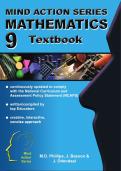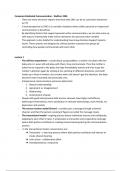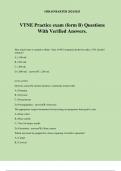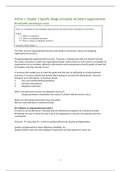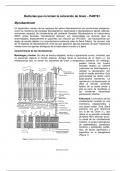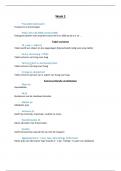Amy Davidson
Item B: Instead of turning to God and the Bible for answers, people now turn to the mass
media and Google. There is a free and on-the-go educaton available through Wi-Fi and 4G.
This erodes the infuence of traditonal religious insttutons and has been accelerated by
globalisaton. People are no longer exposed to a single doctrine or belief by a diverse range.
Halman and Draulans (2006) studied globalisaton and religiosity. They found that the more
globalised the society (strong IT facilites and internet access) the less religious people were.
Reviewing the statement above, assess the view that Britain is becoming a more secular
society. (20 marks)
Secularisaton is defned by Wilson as “the process whereby religious thinking, practce, and
insttutons lose social signifcance”. As Item B states Peoeople are no longer exposed to a single
doctrine or belief by a diverse range’ this makes it possible to argue that Britain has become more
secular as religion is no longer the meta narratve. owever, the increase of New Age Movements
and New Religious Movements can be argued to imply that while perhaps secularisaton of
traditonal religion is occurring, this does not necessarily mean it is overall.
Statstcs of church attendance is one way to argue in favour of the belief that Britain is becoming a
secular society. Wilson identfed that 40% of the populaton attended church in the 19 th century,
however in 2005, only 6. 3% of the adult populaton attends church on a Sunday. There has also been
a trend of decline in religious ceremonies such as marriage, baptsms and the attendance of Sunday
school. This has led to some sociologists claiming the 19 th century was a Pgolden age’ of religiosity
however this is debatable considering the immoral acts in Victorian England of condoning slavery
and encouraging child labour, which leads us to queston did Victorians really value religious beliefs?
The infuence of religion as a social insttuton has also declined. Where religion used to provide
educaton and healthcare, this is now funded by the state, so this means that while religion’s
infuence on society decreases, so do people’s beliefs in those religions, therefore making Britain a
more secular society. On the other hand, it could be argued that religious insttutons in Britain do
stll have a slight infuence as the Queen is head of the hhurch of England and there are 26 religious
leaders sitting in the ouse of Lords. There are plans reduce the number of religious leaders in the
ouse of Lords to allow for diversifcaton of religious representaton, which suggests Britain is
slowly becoming more secular.
There are various explanatons for the trends of secularisaton and Weber put forward the idea of
disenchantment. Weber predicted that the growing disenchantment with the world would
eventually create Pdesacrilisaton of consciousness’ or Pa loss of the capacity to experience a sense of
sacredness and mystery in life’. owever, we must remember that in 2005 the Eurobarometer
survey found that just 38% of people in the UK believed in God. A further 40% believed in some sort
of Pspirit or life force’. This suggests that up to 78% of people stll have some elements of religiosity,
which is the majority so we can assume that Britain is not becoming more secular. On the contrary,
similar to disenchantment is ratonalism. Weber argues that ratonal thought has squeezed out
magical and religious ways of thinking and starts of the process that leads to the dominance of
ratonal modes of thought. this enables science to thrive and provides the basis for technological
advances that give humans more power to control nature - this in turn undermines the religious
worldview in which events can be explained in terms of the will of god/the supernatural. Yet, we
must be aware that people's belief in science also depends on irratonal faith. eoeople don't ofen see
the empirical evidence for science or understand it, but accept with without queston as scientsts
have been elevated to 'high status priests' in society.
Also identfed by Wilson was religious pluralism, which he argues is evidence for secularisaton in
Britain. The church no longer establishes itself to all members of society; Bruce argues that
industrialisaton has created a market place of religions. But Wilson argues that competton
Item B: Instead of turning to God and the Bible for answers, people now turn to the mass
media and Google. There is a free and on-the-go educaton available through Wi-Fi and 4G.
This erodes the infuence of traditonal religious insttutons and has been accelerated by
globalisaton. People are no longer exposed to a single doctrine or belief by a diverse range.
Halman and Draulans (2006) studied globalisaton and religiosity. They found that the more
globalised the society (strong IT facilites and internet access) the less religious people were.
Reviewing the statement above, assess the view that Britain is becoming a more secular
society. (20 marks)
Secularisaton is defned by Wilson as “the process whereby religious thinking, practce, and
insttutons lose social signifcance”. As Item B states Peoeople are no longer exposed to a single
doctrine or belief by a diverse range’ this makes it possible to argue that Britain has become more
secular as religion is no longer the meta narratve. owever, the increase of New Age Movements
and New Religious Movements can be argued to imply that while perhaps secularisaton of
traditonal religion is occurring, this does not necessarily mean it is overall.
Statstcs of church attendance is one way to argue in favour of the belief that Britain is becoming a
secular society. Wilson identfed that 40% of the populaton attended church in the 19 th century,
however in 2005, only 6. 3% of the adult populaton attends church on a Sunday. There has also been
a trend of decline in religious ceremonies such as marriage, baptsms and the attendance of Sunday
school. This has led to some sociologists claiming the 19 th century was a Pgolden age’ of religiosity
however this is debatable considering the immoral acts in Victorian England of condoning slavery
and encouraging child labour, which leads us to queston did Victorians really value religious beliefs?
The infuence of religion as a social insttuton has also declined. Where religion used to provide
educaton and healthcare, this is now funded by the state, so this means that while religion’s
infuence on society decreases, so do people’s beliefs in those religions, therefore making Britain a
more secular society. On the other hand, it could be argued that religious insttutons in Britain do
stll have a slight infuence as the Queen is head of the hhurch of England and there are 26 religious
leaders sitting in the ouse of Lords. There are plans reduce the number of religious leaders in the
ouse of Lords to allow for diversifcaton of religious representaton, which suggests Britain is
slowly becoming more secular.
There are various explanatons for the trends of secularisaton and Weber put forward the idea of
disenchantment. Weber predicted that the growing disenchantment with the world would
eventually create Pdesacrilisaton of consciousness’ or Pa loss of the capacity to experience a sense of
sacredness and mystery in life’. owever, we must remember that in 2005 the Eurobarometer
survey found that just 38% of people in the UK believed in God. A further 40% believed in some sort
of Pspirit or life force’. This suggests that up to 78% of people stll have some elements of religiosity,
which is the majority so we can assume that Britain is not becoming more secular. On the contrary,
similar to disenchantment is ratonalism. Weber argues that ratonal thought has squeezed out
magical and religious ways of thinking and starts of the process that leads to the dominance of
ratonal modes of thought. this enables science to thrive and provides the basis for technological
advances that give humans more power to control nature - this in turn undermines the religious
worldview in which events can be explained in terms of the will of god/the supernatural. Yet, we
must be aware that people's belief in science also depends on irratonal faith. eoeople don't ofen see
the empirical evidence for science or understand it, but accept with without queston as scientsts
have been elevated to 'high status priests' in society.
Also identfed by Wilson was religious pluralism, which he argues is evidence for secularisaton in
Britain. The church no longer establishes itself to all members of society; Bruce argues that
industrialisaton has created a market place of religions. But Wilson argues that competton



